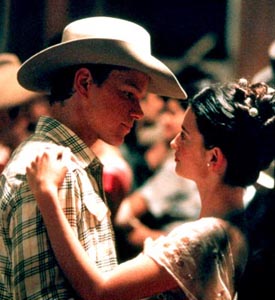![[MetroActive Movies]](/movies/gifs/movies468.gif)
[ Movies Index | Show Times | Santa Cruz Week | MetroActive Central | Archives ]
Horsing Around
Cormac McCarthy's novel pulls up lame in 'All the Pretty Horses'
By Richard von Busack
BADLY CUT and badly photographed, Billy Bob Thornton's film version of Cormac McCarthy's novel All the Pretty Horses was reduced to two hours from a reputed four-hour original, and the result looks like a Benihana chef did the edit. The story tells how the cowboy Cole (Matt Damon) heads to Mexico in 1949 with his partner, Rawlins (Henry Thomas), both seeking work as top ranch hands. Trailing along is a gun-wielding runaway named Jimmy Blevens (Lucas Black, who does the best acting in the movie). In Mexico, Cole falls for Alejandra (Penelope Cruz), the daughter of a ranchero, and pays a harsh penalty for it.
Thornton goes nostalgic, antiquing the visuals with blue filters. Right from the first shot of the horses, apparently illuminated by automobile headlights, it's a cloudy, dim film. Except for Black, the casting is uneventful, too. Cruz, with her flat voice--she's still wrestling with English--doesn't seem like the inevitable "trouble" she calls herself. And her love scene with Damon in a chilly, apparently studio-built pond isn't the stuff of doomed passion. Maybe Damon's appeal is all on the surface, all in that rocklike handsomeness, which, in moments of strain, can look like the swollen face of an injured child. Damon's popularity is a reaction against jumpy actors. There may be more facets to Damon I haven't seen yet, but when he underplays--or plays a Texan--it's not cinema, it's geology.
The job of adapting the book, taken by screenwriter Ted Tally, has to be the easiest buck a writer ever made. McCarthy's sentences are perfect for the movies. Even though little is said, all the action is described. You can hear the rhythms, the tone, the attitudes and the places where the pauses would be in the dialogue. McCarthy's sensual descriptions of horseflesh, the look of the canyons and the ordeals of courage (our hero using the white-hot barrel of a gun to cauterize a wound) are the easy part of the transition from page to screen. But then comes the little matter of the plot. All that Cole and Rawlins go through reminded me of a line in Charles Portis' True Grit. Marshall Rooster Cogburn of Arkansas, overhearing a Texas Ranger boasting of surviving in the desert, replies, "The minute I meet one of you Texas waddies that didn't drink water out of a muddy hoof print, I'll shake his hand and give him a Daniel Webster cigar."
When McCarthy goes lyrical on Mexican machismo, the essential shallowness of the much-praised book is revealed. Thornton fell for that muy macho stuff hard--no surprise if you've seen him act--and he'll get the blame for the failure of this movie. It's possible that a longer version could have given the lines a heightened austerity. Still, even if the movie were longer, the horses wouldn't have been a bit prettier. Were they toned down to keep from competing with Damon?
Copyright © Metro Publishing Inc. Maintained by Boulevards New Media.
![]()
 Looking for Trouble: When cowboy Matt Damon ventures to Mexico in 'All the Pretty Horses,' he runs into woman trouble in the form of Penelope Cruz.
Looking for Trouble: When cowboy Matt Damon ventures to Mexico in 'All the Pretty Horses,' he runs into woman trouble in the form of Penelope Cruz.
All the Pretty Horses (PG-13), directed by Billy Bob Thornton, written by Ted Tally, based on the novel by Cormac McCarthy, photographed by Barry Markowitz and starring Matt Damon and Penelope Cruz, plays at the Riverfront in Santa Cruz.
From the December 27, 2000-January 3, 2001 issue of Metro Santa Cruz.